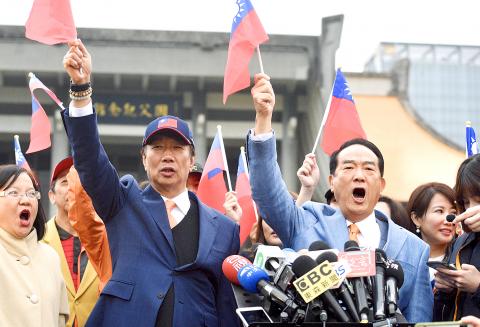The Democratic Progressive Party (DPP) caucus used the tyranny of the majority to ensure the Anti-infiltration Act (反滲透法) passed on Tuesday, People First Party (PFP) Chairman James Soong (宋楚瑜), the party’s presidential candidate, said yesterday.
DPP legislators got the act passed without “coordination among government agencies, establishing enforcement rules or designating an administrative agency to oversee the act’s enforcement,” Soong said, adding that people’s rights would be violated because of the act.
Soong spoke against the act’s passage after attending an early morning flag-raising ceremony at Sun Yat-Sen Memorial Hall, saying that the act would cause Taiwanese who frequently do business or engage in cultural activities and tourism in China to fear for their lives.

Photo: Peter Lo, Taipei Times
“There are 2 million Taiwanese businesspeople in China and they need to attend a lot of activities there. In the future, they and their family members will need to prove to themselves that they are not doing anything to threaten national security. They will be presumed guilty and it will be their responsibility to prove their innocence,” Soong said, adding that the DPP would function like the Taiwan Garrison Command, which suppressed dissidents during the Martial Law era.
People falsely accused of breaching the act would not be able to appeal, which is a complete violation of human rights, he added.
Soong also said at a news conference on Tuesday night that the DPP was so eager to have the act passed before the presidential and legislative elections on Saturday next week, because it apparently intends to use it to influence the results.
“The act pits supporters of different candidates against one another and reinforces people’s anxieties about losing the nation someday if China’s influence and infiltration efforts go unchecked. Passage of the act is of direct benefit to the DPP. We strongly protest this immoral move, which has caused the nation’s democracy to backslide,” he said.
The DPP must not forget that he and other party pioneers worked together 30 years ago to amend Article 100 of the Criminal Code so that no one could be imprisoned for their political beliefs, Soong said, adding that passage of the Anti-infiltration Act is “green terror,” with many viewing it as something the authoritarian regime of the past would have done.
People should not underestimate the act’s impact, as it affects them, as well as their families, friends and classmates, he said, adding that allegations against them could be fabricated.
National security is a collective responsibility, but procedural justice and solid evidence is needed before someone can be proven guilty, Soong said, adding that people should not think that they must compromise their political beliefs just because they do not back the DPP.
Soong urged people to show that they are unwilling to compromise by who they vote for on Saturday next week.
“The elections need to ensure that our democratic values and rights will not be permanently damaged,” Soong said. “If we want to be in charge of the nation again, we should first let the DPP, a party that acts like a bully and a dictator, lose the power to govern by putting into action the votes in our hands.”

Chinese Nationalist Party (KMT) Chairman Eric Chu (朱立倫), spokeswoman Yang Chih-yu (楊智伃) and Legislator Hsieh Lung-chieh (謝龍介) would be summoned by police for questioning for leading an illegal assembly on Thursday evening last week, Minister of the Interior Liu Shyh-fang (劉世芳) said today. The three KMT officials led an assembly outside the Taipei City Prosecutors’ Office, a restricted area where public assembly is not allowed, protesting the questioning of several KMT staff and searches of KMT headquarters and offices in a recall petition forgery case. Chu, Yang and Hsieh are all suspected of contravening the Assembly and Parade Act (集會遊行法) by holding

PRAISE: Japanese visitor Takashi Kubota said the Taiwanese temple architecture images showcased in the AI Art Gallery were the most impressive displays he saw Taiwan does not have an official pavilion at the World Expo in Osaka, Japan, because of its diplomatic predicament, but the government-backed Tech World pavilion is drawing interest with its unique recreations of works by Taiwanese artists. The pavilion features an artificial intelligence (AI)-based art gallery showcasing works of famous Taiwanese artists from the Japanese colonial period using innovative technologies. Among its main simulated displays are Eastern gouache paintings by Chen Chin (陳進), Lin Yu-shan (林玉山) and Kuo Hsueh-hu (郭雪湖), who were the three young Taiwanese painters selected for the East Asian Painting exhibition in 1927. Gouache is a water-based

Taiwan would welcome the return of Honduras as a diplomatic ally if its next president decides to make such a move, Minister of Foreign Affairs Lin Chia-lung (林佳龍) said yesterday. “Of course, we would welcome Honduras if they want to restore diplomatic ties with Taiwan after their elections,” Lin said at a meeting of the legislature’s Foreign Affairs and National Defense Committee, when asked to comment on statements made by two of the three Honduran presidential candidates during the presidential campaign in the Central American country. Taiwan is paying close attention to the region as a whole in the wake of a

OFF-TARGET: More than 30,000 participants were expected to take part in the Games next month, but only 6,550 foreign and 19,400 Taiwanese athletes have registered Taipei city councilors yesterday blasted the organizers of next month’s World Masters Games over sudden timetable and venue changes, which they said have caused thousands of participants to back out of the international sporting event, among other organizational issues. They also cited visa delays and political interference by China as reasons many foreign athletes are requesting refunds for the event, to be held from May 17 to 30. Jointly organized by the Taipei and New Taipei City governments, the games have been rocked by numerous controversies since preparations began in 2020. Taipei City Councilor Lin Yen-feng (林延鳳) said yesterday that new measures by